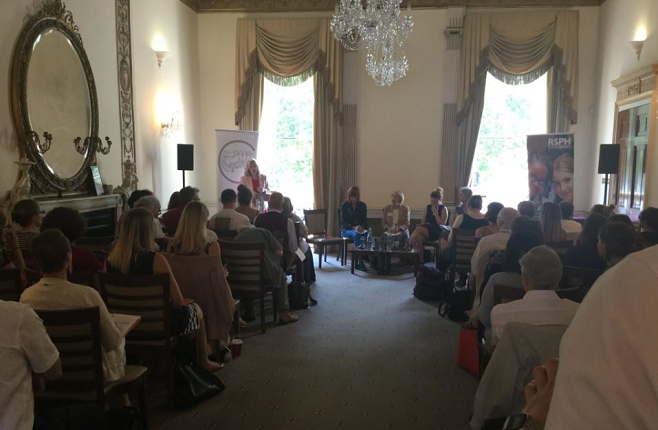Panel event: That Age Old Question

Last week we held the launch event for ‘That Age Old Question’, a new report from the Calouste Gulbenkian Foundation (UK Branch) in partnership with the Royal Society for Public Health (RSPH). On the panel were writer and broadcaster Janet Street-Porter; author of How to Handle Later Life, Marion Shoard; editor of Gransnet, Lara Crisp; and project director of Cocktails in Care Homes, Phoebe Grudzinskas.
Chief Executive of the RSPH, Shirley Cramer started the session by emphasising the importance of discussing ageism, particularly in the context of media headlines about ‘bed-blocking’ and a ‘tsunami of ageing’. After introducing the report’s key findings and recommendations, Shirley invited the panel to share their views.
Positive ageing
Janet began by suggesting the report findings should be viewed more positively. She warned against focusing too much on the minority of older people who are struggling. Her advice? We should simply enjoy life at every age. Janet suggested that adopting a more positive lens could be a way of changing the narrative on ageing.
Difficult transitions
Challenging Janet’s comments, Marion explained that ageing can be a limiting experience for many people, particularly for the 410,000 older people who live in care homes. She pointed out that 29% of nursing homes in England require improvement. It’s not always as simple as adopting a positive attitude.
Lara explained that many members of the Gransnet community worry about the transition to later life, with a lot of them expressing concerns about being vulnerable or feeling invisible when they are older.
One audience member asked how we can all play a role in supporting older people who are struggling. Small gestures, such as taking time to talk to neighbours, were identified as steps in the right direction.
Bringing back choice in care homes
Marion stressed that people must understand that older people are fundamentally no different to the rest of society. She praised projects like Cocktails in Care Homes for improving the lives of care home residents, and showing that older people share similar interests to younger people.
Life in care homes is often very regimented, and Phoebe explained that Cocktails in Care Homes is “trying to bring back choice” through using the arts. The project emerged from residents themselves, who wanted parties in the evenings rather than an early bedtime. Phoebe emphasised the need for such projects, as underpaid and overworked care staff often don’t have time to sit and talk with residents. She called for more high-quality activities to be brought into care homes.
Media portrayals
The panel agreed that the media’s portrayal of older people is often dehumanising. Marion referred to the clichéd images of wrinkled hands that accompany most news articles about older people. Janet agreed that media coverage of care homes in particular is nearly always negative. However, she acknowledged that this would be hard to change as the majority of stories that make the news are negative.
The Cult of Youth
With much of the discussion focusing on older people, one audience member pondered how to change younger people’s attitudes to their own ageing, asking the panel “How do you make ageing sexy?”
Janet argued that “there has always been a cult of youth” and questioned if this would ever change. However, as one audience member commented, attitudes toward ageing and older people vary across cultural and ethnic backgrounds. This was identified in the report, which found that people from black ethnic backgrounds are three times more likely to have a positive attitude towards ageing and older people.
The stratification of society was identified by one audience member as contributing to ageist attitudes among young people, as younger generations rarely interact with older people. The report’s recommendation to bring services such as nurseries, youth clubs, and care homes under the same roof was welcomed by the panel.
Normalising ageing
Marion stressed that “we must normalise ageing”. One way this was discussed was in relation to appearance, and the pressures on women, in particular, to remain looking youthful.
One suggestion, put forward by Marion, was for older people to act as positive role models for younger people by showing that it is fine to ‘look your age’. While Janet disagreed with the concept of role models, she agreed that it is helpful for people to see that there are different options available to them and that they don’t have to conform. She also welcomed the fact that the term ‘anti-ageing’ is becoming less popular with consumers. The report calls to end the use of the term in the cosmetics and beauty industry.
Looking forward
Following a lively debate and excellent questions from the floor, Shirley ended the session by urging audience members to think about how we can take forward the recommendations. Thank you to our speakers, and all those who attended.
The Calouste Gulbenkian Foundation (UK Branch) has worked in the ageing field for a decade. Currrently, its Transitions in Later Life programme aims to help people in mid to later life feel better supported to manage changes as they age.
Read the report